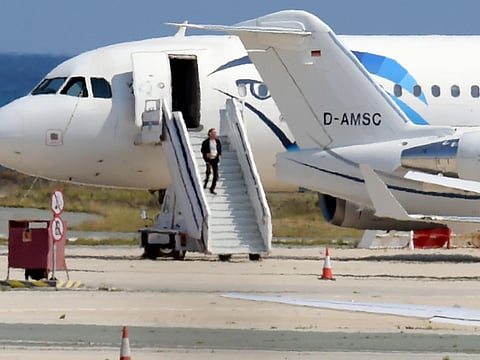EgyptAir hijack re-ignites debate on security
Experts suggest specialised company to be in charge of securing Egypt's airports

Cairo: Last week’s hijack of an EgyptAir passenger aircraft should prompt authorities to devolve security at the nation’s airports to a specialised company, some experts have suggested.
“This step is necessary because most countries exporting tourists to Egypt believe that security measures at Egyptian airports are too inadequate to encourage them to resume tourist traffic to Egypt,” said Mahmoud Ali, a manager of a travel company in Cairo.
“Perception of Egypt abroad has been harmed by the latest hijack that made news around the world and was exploited by some critics of the [Egyptian] regime to cast doubts over security at the Egyptian airports,” Ali told Gulf News.
Last Tuesday, an Egyptian man hijacked the EgyptAir plane, which was on a domestic Cairo–Alexandria flight and diverted it to Cyprus.
The hijacker, identified as Saif Edin Mustafa, threatened to blow up the airliner with a suicide explosive vest. The Airbus A320 aircraft landed at the Cypriot airport of Larnaca.
After a standoff of more than six hours there, all the 55 passengers and eight-member crew were released unharmed and the hijacker surrendered. Cypriot and Egyptian authorities later said the explosive belt was fake.
In the wake of the drama, the Egyptian government confirmed that security at airports is tight. The Interior Ministry, which is in charge of securing airports, released CCTV footage of Mustafa being thoroughly frisked before boarding the plane.
However, Mohammad Fela, a tourism investor in the Red Sea region, sees the situation differently.
“Tourists will not flock back to Egypt unless the government recruits a foreign professional company to secure airports,” he told independent newspaper Al Watan.
“The hijacking of the EgyptAir plane has dashed any hopes that the tourism sector will recover in the next few months although security personnel at the Bourj Al Arab airport do not deserve blame for what happened,” he said, referring to the Alexandria airport where the aircraft took off shortly before its hijack.
“The incident has left behind negative impact in tourist-exporting countries, especially Russia.”
In October last year, a Russian passenger jet crashed in Egypt’s Sinai shortly after its departure from the Red Sea resort town of Sharm Al Shaikh, killing all 224 on board. A Daesh affiliate claimed downing the plane with a bomb allegedly smuggled on board. Russia has since suspended Egypt-bound flights, dealing a harsh blow to Egyptian tourism that has suffered since the 2011 revolt that forced long-standing president Hosni Mubarak to step down. Tourism, a key foreign currency earner for Egypt, represents 11.3 per cent of national economy, according to official figures.
In the wake of the Russian plane crash, the Egyptian government recruited the service of the British consultancy firm Control Risks to revise security at the airports. Further security measures have also been taken, which Mamdouh Abdul Haleem, a security expert, sees “enough and effective”.
“The EgyptAir plane hijack proved that security at the Egyptian airports is very tight and complies with international standards,” he told Gulf News. “Claims to the opposite are made with the aim of wrecking the Egyptian economy,” Abdul Haleem added. “Egyptian airports have successfully passed all inspections conducted by international aviation organisations over recent months. Therefore, we should not lose confidence in ourselves or harm our sovereignty by recruiting a foreign security company just to please some travel agencies abroad.”
Sign up for the Daily Briefing
Get the latest news and updates straight to your inbox



